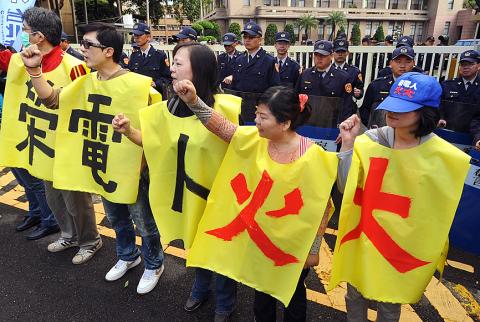Separated by a metal gate, unionists yesterday rallied outside the Executive Yuan against the government’s plans to reform labor insurance and pension systems as Premier Sean Chen (陳冲) and his Cabinet members posed for photographs following their resignation as part of a Cabinet reshuffle.
The government has come up with a program to reform the pension system that would decrease the payout to retirees while gradually increasing the premium paid by workers — which would increase to 19.5 percent of a worker’s salary.
“By paying the retirees less and making people who are still working pay more, the so-called ‘reform’ is taking away the protection that the labor insurance was designed to give us,” National Federation of Independent Trade Unions executive director Chu Wei-li (朱維立) said.

Photo: Liao Chen-huei, Taipei Times
“It’s unfair that the officials who came up with a reform plan that benefits big corporations while exploiting workers are now promoted to higher positions,” he added.
Chu said he was referring to Vice Premier Jiang Yi-huah (江宜樺), who is to take over the premiership on Feb. 18, and Minister Without Portfolio Kuan Chung-min (管中閔), who is to become the head of the Council for Economic Planning and Development.
Chuang Fu-kai (莊福凱), chairman of the Taoyuan County Confederation of Trade Unions, who has worked for over 30 years and is near retirement, criticized the reform proposal.
“Under the current system, I could lead a decent life in retirement with the retirement payout from the labor insurance,” Chuang said. “It’s upsetting that the government is cutting my payouts while at the same time asking my children to pay more.”
Huang Shih-ting (黃仕庭), a 26-year-old worker, said the reform plans were “robbing money from young workers from two sides.”
“We are to pay a higher premium, but when the payouts for our parents are cut, we will have to provide more money to our parents,” he said.
Chu said that following the official announcement of the reform plan, business leaders urged the government to cut the portion of an employee’s retirement pension shouldered by the employer, adding that it would make it hard for businesses to survive with such a heavy burden.
“Why would they run businesses in China where the employer’s burden is even heavier?” Chu said.
He said that according to the current measure, 8 percent of an employee’s monthly salary would go to the fund for their pensions.
The 8 percent premium is divided into three portions; that the employer pays 70 percent, the employee pays 20 percent, while the government pays 10 percent.
“In China, 20 percent of an employee’s salary is to be paid as premium of labor insurance and it’s fully paid by the employer,” Chu said.
The unions urged the government to fill the financial hole in the labor insurance system by raising corporate taxes, instead of getting the money from the employees.

Taiwanese can file complaints with the Tourism Administration to report travel agencies if their activities caused termination of a person’s citizenship, Mainland Affairs Council Minister Chiu Chui-cheng (邱垂正) said yesterday, after a podcaster highlighted a case in which a person’s citizenship was canceled for receiving a single-use Chinese passport to enter Russia. The council is aware of incidents in which people who signed up through Chinese travel agencies for tours of Russia were told they could obtain Russian visas and fast-track border clearance, Chiu told reporters on the sidelines of an event in Taipei. However, the travel agencies actually applied

Japanese footwear brand Onitsuka Tiger today issued a public apology and said it has suspended an employee amid allegations that the staff member discriminated against a Vietnamese customer at its Taipei 101 store. Posting on the social media platform Threads yesterday, a user said that an employee at the store said that “those shoes are very expensive” when her friend, who is a migrant worker from Vietnam, asked for assistance. The employee then ignored her until she asked again, to which she replied: "We don't have a size 37." The post had amassed nearly 26,000 likes and 916 comments as of this

New measures aimed at making Taiwan more attractive to foreign professionals came into effect this month, the National Development Council said yesterday. Among the changes, international students at Taiwanese universities would be able to work in Taiwan without a work permit in the two years after they graduate, explainer materials provided by the council said. In addition, foreign nationals who graduated from one of the world’s top 200 universities within the past five years can also apply for a two-year open work permit. Previously, those graduates would have needed to apply for a work permit using point-based criteria or have a Taiwanese company

The Shilin District Prosecutors’ Office yesterday indicted two Taiwanese and issued a wanted notice for Pete Liu (劉作虎), founder of Shenzhen-based smartphone manufacturer OnePlus Technology Co (萬普拉斯科技), for allegedly contravening the Act Governing Relations Between the People of the Taiwan Area and the Mainland Area (臺灣地區與大陸地區人民關係條例) by poaching 70 engineers in Taiwan. Liu allegedly traveled to Taiwan at the end of 2014 and met with a Taiwanese man surnamed Lin (林) to discuss establishing a mobile software research and development (R&D) team in Taiwan, prosecutors said. Without approval from the government, Lin, following Liu’s instructions, recruited more than 70 software